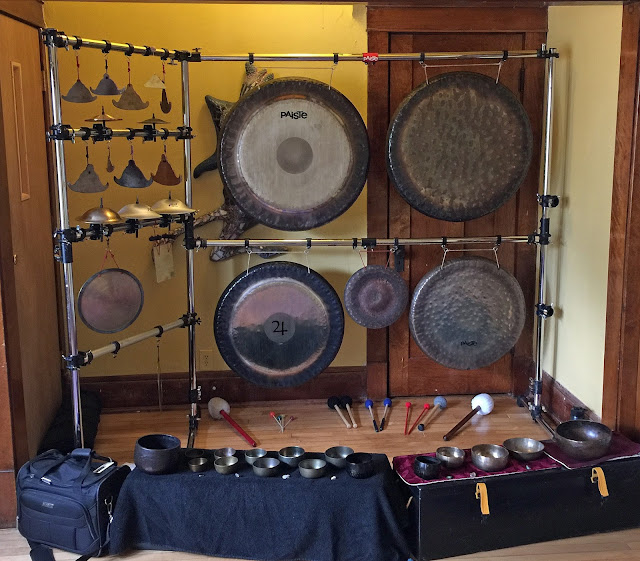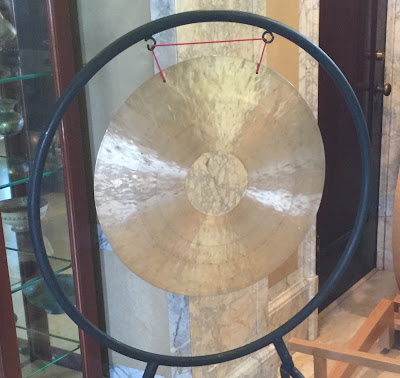Don't Be Afraid To Give It All Away
I remember when I was younger, learning how to play music and percussion, that so much of it was discovery. And it was so exciting to get together with friends and share what we all had discovered, "Check this out!" Being a drummer/percussionist, you're automatically part of a larger group, a fraternity of sorts. And a thing I've always loved is how drummers are so willing to share their ideas.
I remember as an aspiring teenage drummer writing letters to various big name drummers of the time asking them questions. Many of them were kind enough to write back with answers. The same when seeing a drummer in concert, many were more than glad to talk to people after their concert and answer all manner of drumming questions. This sort of response made an impression on me.
I've been going to PASIC (Percussive Arts Society International Convention) since 1987. PASIC is a 4 day event that gathers 5,000-6,000 percussionists in a convention center with hundreds of scheduled concerts, clinics, master classes, competitions, lectures, etc. While there's all these formal sessions, much of the teaching and information goes on in between things, in the hallways, lounges, and other areas. In the past, both the late , great Jim Chapin and Ed Thigpen were iconic figures who hung out and passed on their knowledge to anyone who wanted to know it. Chapin, always with his sticks and practice pad, would gladly demonstrate the secrets of the Moeller Technique for drumming. Thigpen would always have brushes in hand and be ready to teach the fine points of this vanishing art. These 2 men were giants of the percussion community and could've just as easily not given anything away. But they were willing to give it all away—for free!
I remember one time hanging out with jazz & big band drummer, John Riley, after a clinic, when a young kid came up and asked him a question about the Moeller stroke (a particular style of striking the drum taught by Sanford Moeller, based on his observations of Civil War drummers. It uses a whipping motion to make the stroke efficient & effortless.). Riley took out a stick and started playing on top of a speaker cabinet, demonstrating how the stroke went. He was more than willing to take a few minutes to talk to those who had gathered and give away what he knew. This impressed me. And I could give you many more examples of big (and not so big) name drummers stopping to chat with other drummers and help them out with questions they had.
Here we are in 2014 and the prevailing attitude seems to be that knowledge itself is finite, and if you give it away, somehow you lose something, or that if you show someone else what you can do, they'll steal it and become better or more famous than you!
It's a big Universe and there's enough to go around for everybody. No one knows everything, but if we all share what we know, we can all learn more, and most importantly, we can all grow our art form into new and exciting territory. So whether you play percussion, dance, paint, shoot films, etc., don't be afraid to give away what you know to others. Rather than diminishing you, it expands you and creates more opportunities.
What have you shared lately?
~ MB
*Note: this blog post is in response to various conversations I've been involved in debating the idea of giving away what you know vs selling what you know. In all fairness, I have to say that I engage in both. I write this, and another percussion blog, where I talk about music, percussion, philosophy, etc., and anyone can access them and read them for free. I also answer a lot of e-mail from around the world, answering questions that people have. In addition, I have written, and sell, various percussion books, and have some new ones on the way. I also teach private lessons and workshops where I am paid. I think it's important to balance giving away what you know, and selling what you know.
I remember as an aspiring teenage drummer writing letters to various big name drummers of the time asking them questions. Many of them were kind enough to write back with answers. The same when seeing a drummer in concert, many were more than glad to talk to people after their concert and answer all manner of drumming questions. This sort of response made an impression on me.
I've been going to PASIC (Percussive Arts Society International Convention) since 1987. PASIC is a 4 day event that gathers 5,000-6,000 percussionists in a convention center with hundreds of scheduled concerts, clinics, master classes, competitions, lectures, etc. While there's all these formal sessions, much of the teaching and information goes on in between things, in the hallways, lounges, and other areas. In the past, both the late , great Jim Chapin and Ed Thigpen were iconic figures who hung out and passed on their knowledge to anyone who wanted to know it. Chapin, always with his sticks and practice pad, would gladly demonstrate the secrets of the Moeller Technique for drumming. Thigpen would always have brushes in hand and be ready to teach the fine points of this vanishing art. These 2 men were giants of the percussion community and could've just as easily not given anything away. But they were willing to give it all away—for free!
John Riley at Vic's Drum Shop, Chicago (photo from Vic's Drums)
I remember one time hanging out with jazz & big band drummer, John Riley, after a clinic, when a young kid came up and asked him a question about the Moeller stroke (a particular style of striking the drum taught by Sanford Moeller, based on his observations of Civil War drummers. It uses a whipping motion to make the stroke efficient & effortless.). Riley took out a stick and started playing on top of a speaker cabinet, demonstrating how the stroke went. He was more than willing to take a few minutes to talk to those who had gathered and give away what he knew. This impressed me. And I could give you many more examples of big (and not so big) name drummers stopping to chat with other drummers and help them out with questions they had.
Here we are in 2014 and the prevailing attitude seems to be that knowledge itself is finite, and if you give it away, somehow you lose something, or that if you show someone else what you can do, they'll steal it and become better or more famous than you!
It's a big Universe and there's enough to go around for everybody. No one knows everything, but if we all share what we know, we can all learn more, and most importantly, we can all grow our art form into new and exciting territory. So whether you play percussion, dance, paint, shoot films, etc., don't be afraid to give away what you know to others. Rather than diminishing you, it expands you and creates more opportunities.
What have you shared lately?
~ MB
Chop Wood | Carry Water | Play Gongs




Comments
Post a Comment